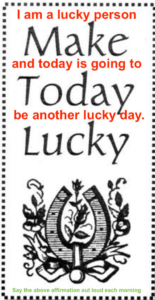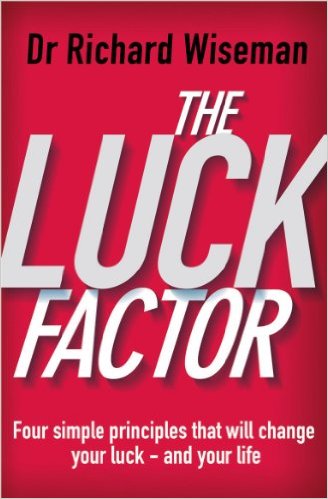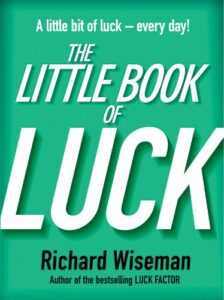LUCK FACTOR – Are You Feeling Lucky? If you want to increase your luck, there is a scientific way to do that. Read on if you want to know how to get luckier…
You are lucky. If you’re reading this blog, you’ve demonstrated to yourself that you are already lucky and you’ve made the first step to becoming more lucky in any area of your life, personal and professional. Keep reading…
The Luck Project was originally conceived to scientifically explore psychological differences between people who considered themselves exceptionally lucky and unlucky. This initial work was funded by The Leverhulme Trust and undertaken by Dr. Richard Wiseman in collaboration with Dr. Matthew Smith and Dr. Peter Harris. To explore the subject more read ‘The Luck Factor’ by Dr. Richard Wiseman. Through the Luck School, unlucky people become lucky and lucky people become even luckier.
“Fortune favours the prepared mind.” Louis Pasteur
Dr. Wiseman has since built upon this initial work by identifying the four basic principles used by lucky people to create good fortune in their lives and developing techniques that enable individuals to enhance their own good luck.
This research has involved working with hundreds of exceptionally lucky and unlucky people and has employed various methods – including psychometric questionnaires, laboratory experiments and extensive interviewing – to better understand the psychology of luck.
Luck is: being in the right place, at the right time, doing the right things. But how? By being in the right state of mind – the luck factor mindset (which is in our control).
The results of this work reveal that people are not born lucky. Instead, lucky people are, without realising it, using 4 basic principles to create good fortune in their lives.
1. Maximise Chance Opportunities (Possibilities)
Lucky people are skilled at creating, noticing, predicting and acting upon chance opportunities and possibilities. They do this in various ways, including
1a) building and maintaining a strong ‘network of luck’ and connections, (research suggests that social connections are critical for success, health and happiness in life – check six-degrees of separation concept which states that everyone and everything that you want or need is just six or fewer steps away – “six degrees of separation theory” we’re living in a small world where everything and everyone is connected to one another – “What you do, what you say and what you think can influence other people by morphic resonance. There is no immoral filter in morphic resonance, which means that we have to be more careful about what we are thinking if we are concerned about the affect we have on others.” Rupert Sheldrake). The unlucky people tend to be social isolates.
1b) adopting a relaxed attitude to life and by
1c) being open to new experiences, opportunities and possibilities in their life.
The classic story of boats and helicopters is a good example of how unlucky people miss opportunities.
“Ability is of little account without opportunity.” Napoleon Bonaparte
2. Listening to Lucky Hunches (Intuition)
Lucky people make effective decisions by listening to their intuition and gut feelings as well as common sense. In addition, they take steps to
2a) listen to their gut feelings and hunches,
2b) actively boost their intuitive abilities by, for example, meditating and clearing their mind of other thoughts, reflecting on their hunches and intuitions, focusing, learning to dowse, etc
[an extra speed reading tip: use direct learning to download this book/ebook into your subconscious mind for immediate results]
3. Expect Good Fortune (Intentions, Optimism)
 Lucky people are certain that the future is going to be full of good fortune and opportunities. These expectations and life-affirming intentions become self-fulfilling prophecies by helping lucky people persist in the face of failure and shape their interactions with others in a positive way. In addition, they
Lucky people are certain that the future is going to be full of good fortune and opportunities. These expectations and life-affirming intentions become self-fulfilling prophecies by helping lucky people persist in the face of failure and shape their interactions with others in a positive way. In addition, they
3a) expect their good fortune to continue in the future
3b) attempt to achieve their goals, even if their chances of success seem slim, and persevere in the face of failure
3c) expect their interactions with others to be lucky and successful.
“I am a lucky person and today is going to be another lucky day.” Research suggests that lucky people use affirmations such as this one to get even more lucky. You’re reading this now, so you’re lucky already – use prompt reminders on your mobile phone to remind you on a daily bases.
4. Turn Bad Luck to Good (Reframing & Resilience)
Lucky people employ various psychological reframing and resilience (an ability to bounce back) techniques to cope with, and often even thrive upon, the ill fortune that comes their way. For example, they
4a) spontaneously imagine how things could have been worse – see the positive side of their bad luck,
4b) are convinced that any ill fortune in their life will, in the long run, work out for the best (they understand and apply the yin-yang principle in their lives); a good example is Borja, a small town in Spain which was saved by botched restoration of century-old Christian ‘Ecce Homo’ fresco of Jesus
4c) do not dwell on the ill fortune,
4d) take control of the situation and take constructive steps to prevent or avoid more bad luck in the future.
The most recent research has shown that these four principles can be used to enhance the amount of good fortune that people experience in their lives.
or read the short version or ebook of the full book The Little Book of Luck by Dr Richard Wiseman
5. And use feng shui to boost your luck
Feng shui is very much focused on boosting luck. Many feng shui remedies and interventions are specifically designed to enhance luck, good fortune, blessings and prosperity and prime you to become more lucky. Feng shui aspires to bring more luck by optimising one’s work and home environments. Feng shui studies heaven luck, human luck and earth luck (feng shui). The word ‘auspicious’ is one of the most used words in the feng shui dictionary and feng shui glossary of terms. Companies that use feng shui to enhance their business list the luck factor as one of their top values. Well-known hotels and casinos use feng shui to ensure auspicious feng shui for their businesses.
“Charms have not their power from contracts with spirits, but proceed wholly from strengthening the imagination.”
Sir Francis Bacon, Renaissance author and courtier
Luck in different cultures
In most cultures, luck has a place and a name. Synchronicity, serendipity, kismet, fate, destiny, omens, good fortune, blessings, the law of attraction, providence, predestination, grace, karma, quantum entanglement, morphic resonance, coherence, Tao, chance, affirmations, miracles, and so on are some of the terms used all over the world for ‘luck’. Most cultures have rituals and ceremonies to align with larger forces to allow for personal and spiritual transformation on both horizontal and vertical timelines.
Is luck a set of skills?
We make decisions and take risks every day. When people are good at something, they attribute it to their skills, but when they’re not good at something, they attribute it to luck as if they are separate boxes or separate domains. According to Adam Kucharski, a mathematician and author of The Perfect Bet: How Science and Math Are Taking the Luck Out of Gambling, luck and skills are on a spectrum. So, although AI can beat players in most games now, there is still the question of the intrinsic nature of luck. We know how luck behaviours, what it does but what is it? Philosophers ponder on this question and we have some clues from a French philosopher, Gilles Deleuze, who suggested how to “affirm the chance”. There are two approaches in this context, for a gambler, the final outcome lies at the end of the causal chain of events, not in the event itself. Whereas for the player, the singular event (a throw of dice, for example) is itself fateful, necessary and enough. The single throw is not part of a bigger fate or ‘destiny’ but on the contrary, the single throw is the expression of the totality of fate. The event itself is positive and not a negative reproduction of its predecessors. Deleuze says that coincidence is the opposite of the continuum.

Adam Kucharski on luck and skill spectrum
Get a lucky charm
Carry a lucky charm such as a lucky coin, a gemstone or even just a pebble – anything that you believe will bring you good luck. Whatever it is, slip it into your pocket or place it somewhere you will see it every day and let it remind you to be open, happy, opportunistic, optimistic and lucky. Dr Wiseman conducted a scientific experiment with one hundred people and the results revealed that the charms provided an amazing psychological benefit, giving people an increased sense of security and making them more positive about the future.
Use lucky affirmations
Research suggests that lucky people are very positive about the future, and these expectations help transform their dreams into reality. To help convince yourself that your future will be bright and lucky, say the following affirmation out loud each morning for a week: ‘I am a lucky person and today is going to be another lucky day.’ To make it easier, add this affirmation to your mobile phone reminders so it wakes you up every day.
Change your self-perception to be more lucky
Simply, lucky people have a perception that they’re lucky. If you don’t think you’re lucky there are several different ways of changing your self-perception such as keep a luck journal for example. Every day write (thinking about it doesn’t seem to work so well) 1) GRATITUDE to others: list people you’re grateful to 2) THE BEST THING that happened in 24 hours: anything 3) SOMETHING NEGATIVE that used to happen but no longer happens: perhaps a change of habit, or attitude, etc.
Feel lucky and fortunate – and you’ll do better in life
Researchers from King’s College London and the University of California suggest, after studying 2200 twins, that people who feel lucky and fortunate are more likely to do better in life, have lower levels of depression, anxiety and troubling behaviour (less likely to commit a crime) and were, of course, more likely to be optimistic and employed. In short, feeling lucky and happy is the key to doing better in life. So, “fake it until you make it” aphorism is a good start to a better life. What else can you do right now to feel lucky and fortunate? Count your blessings and be grateful for whatever life you have (it could have been worse!).
This confirms findings from William James and Alfred Adler. “Action seems to follow feeling, but really action and feeling go together; and by regulating the action, which is under the more direct control of the will, we can indirectly regulate the feeling, which is not. Thus the sovereign voluntary path to cheerfulness, if our spontaneous cheerfulness be lost, is to sit up cheerfully, to look round cheerfully, and to act and speak as if cheerfulness were already there. If such conduct does not make you soon feel cheerful, nothing else on that occasion can. So to feel brave, act as if we were brave, use all our will to that end, and a courage-fit will very likely replace the fit of fear.” said William James, the father of psychology, in The Gospel of Relaxation, On Vital Reserves (1922). Also, in the 1920s, Alfred Adler (Austrian medical doctor, psychotherapist) developed a therapeutic technique that he called “acting as if” strategy or “role play” which gave his clients an opportunity to practice alternatives, positive or desired behaviours to dysfunctional ones. Read The As If Principle: The Radically New Approach to Changing Your Life by Richard Wiseman
What is Luck? Top Feng Shui Tips to Boost Luck in any Area of your Life – and using Scientific Principles
Research on luck vs talent
According to Robert H Frank, the author of Success and Luck: Good Fortune and the Myth of Meritocracy and three Italian researchers from the University of Catania (two physicists Alessandro Pluchino and Andrea Rapisarda and the third, an economist, A. E. Biondo) who were using a computer model to find out what is more important for success ie luck or talent, suggest that the majority of the top 20% wealthy people are not the most talented or skilled or intelligent or with a mindset for risk-taking but rather average. Luck is the major factor in their success.





